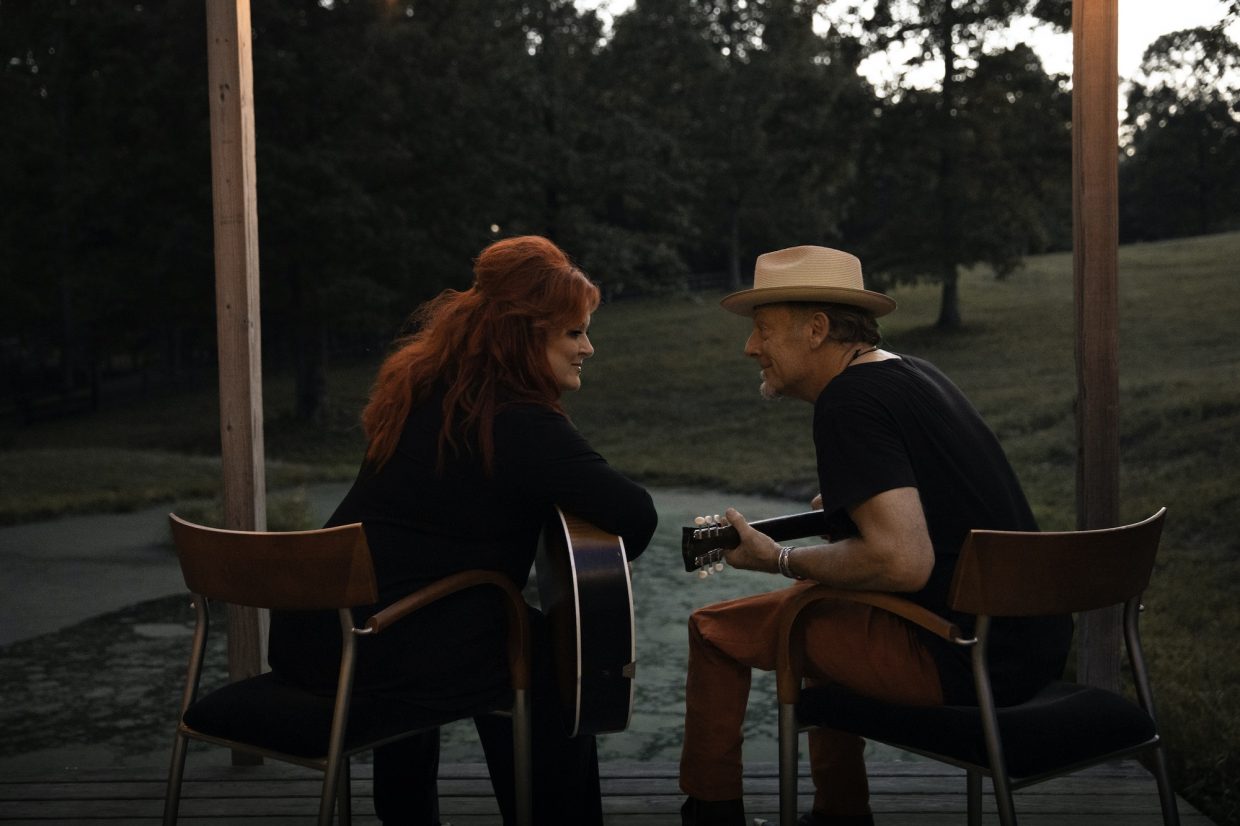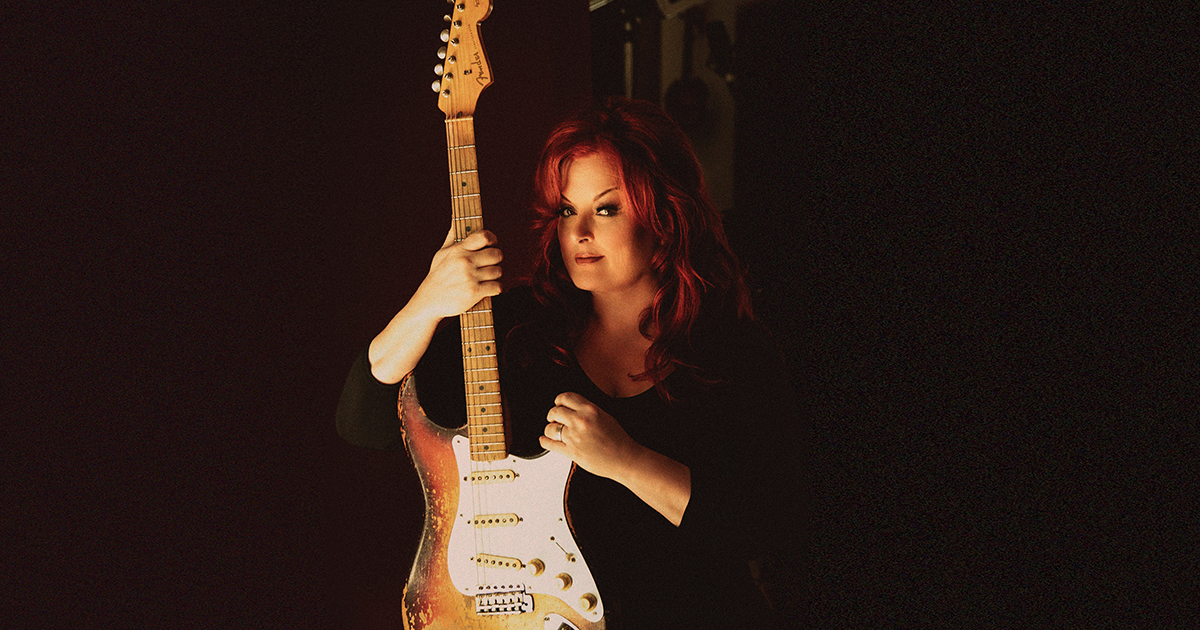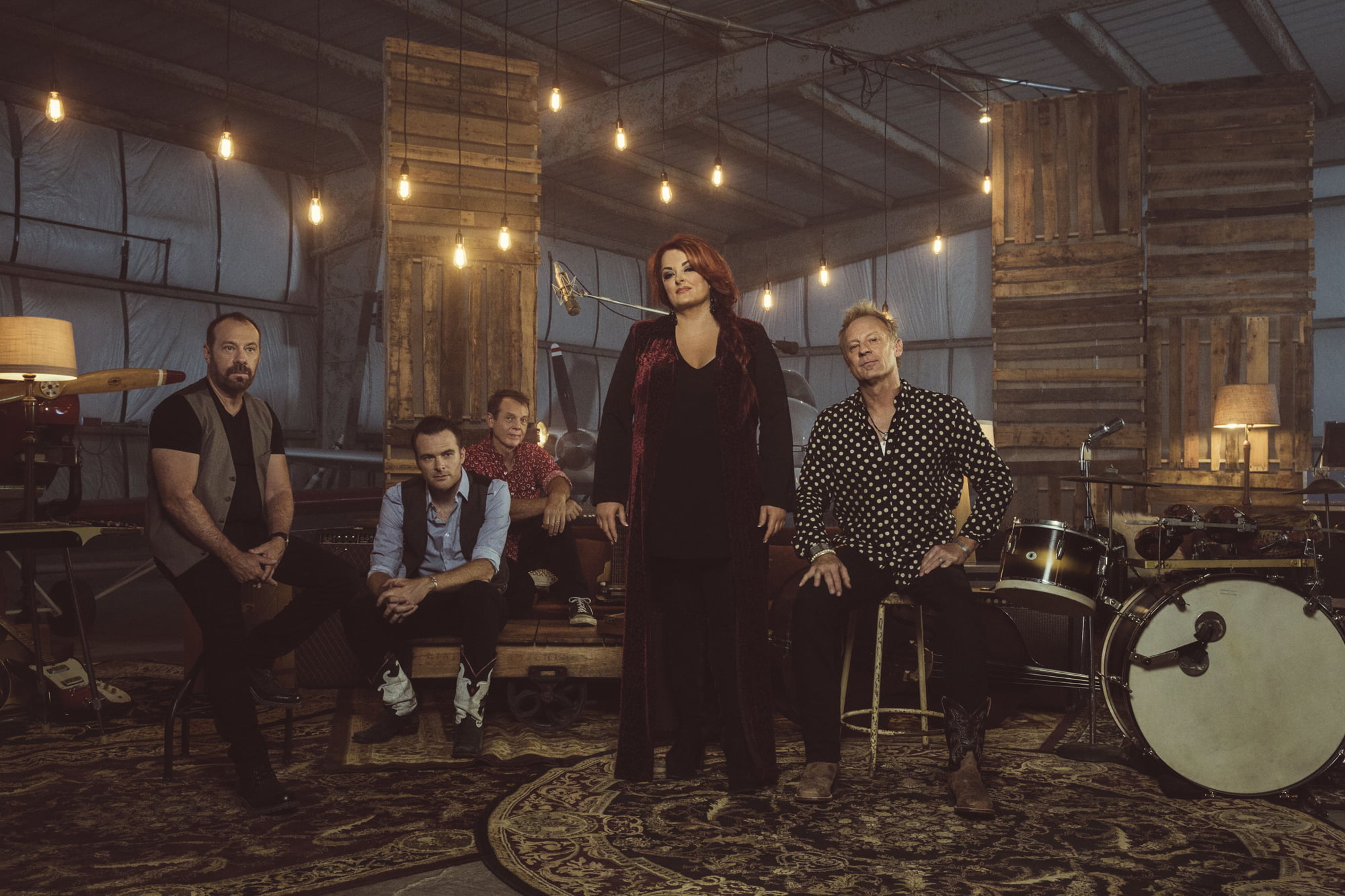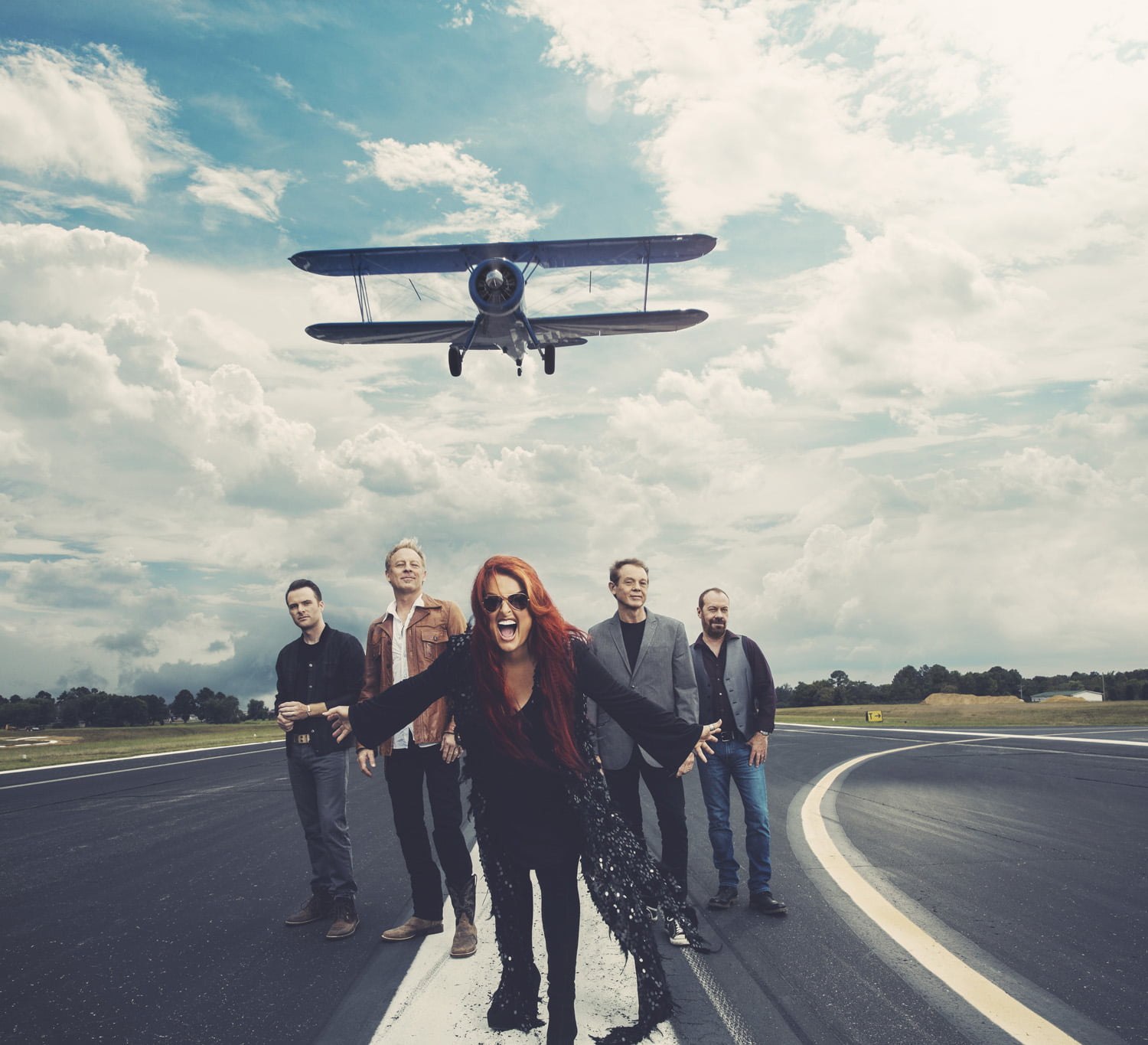Although she’s been an entertainer for decades, Wynonna says she hasn’t ever been much for making music around the house – at least not until this year.
“I think it’s because I was so famous at 18 that the time home was spent just being quiet, because my world was so noisy,” she tells BGS. “Somebody who came to stay with us for a couple of days made a comment, ‘How come I never hear you hum or sing around the house?’ And I looked at her and I was like, ‘I don’t know!’ I had never thought of it.”
If nothing else, life in quarantine has given this country legend time to think. After all, she’s been touring since the ‘80s, first with the Judds, then as a solo artist, and eventually some of both. 2020 is the first extended break she’s taken since late ’94 and early ’95, for the birth of her son, Elijah, who is now a first responder. (She’s making a lunch for him as we’re speaking.) Off the road now for six months, she says her routine has gone from staring off into space every night, to doing Facebook Live sessions with her husband Cactus Moser, to calling up old friends and dusting off her vinyl records.
And to show for her efforts, she’s releasing an EP of covers titled Recollections. The five-song set offers her intimate, off-the-cuff renditions of classics like Grateful Dead’s “Ramblin’ Rose,” Nina Simone’s “Feelin’ Good” and John Prine’s “Angel From Montgomery,” with some of the project’s audio tracks taken directly from her Facebook live sets. She called BGS from her farm in Franklin, Tennessee, to talk about all of it, and offered a film recommendation, too.
BGS: While listening to this EP, I was pleased to hear that you and I have the same favorite verse of “Angel From Montgomery.” What was on your mind when you recorded that one?
Wynonna: Well, it’s tough and it’s a part of life… I was in the living room and I was just practicing. I haven’t done this much practicing in a long time, but I’m home and what else is there to do?! [Laughs] And I got a text from my agent who was a personal friend of John Prine and his family, and he said that John had passed. I sat there, and it’s one of those weird moments in your life when you get that call. I was overwhelmed, sitting there, and all of a sudden — I’m not kidding — I just started to play it on my guitar. I thought, “Oh my God! Oh my God!” I’ve known this song since I was 15 years old, and I started playing it like I played it all those years ago.
I kid you not, Cactus comes in and I looked at him, he looked at me, and I started singing it – he got tears in his eyes, because it was a moment. It’s like that moment when you stand there doing your vows, it’s just a heavy moment. And I said, “I think we need to do this tonight.” So we did it on Facebook Live, which is what you’re hearing. We’re sitting there together and it’s me paying tribute to my hero. One of my heroes is John Prine and we must not forget what this man gave to us. It was one of those sweet, beautiful moments of reflection on my part of how far I’ve come as an artist.
I know you play acoustic guitar on that, too. Which guitar did you play?
I played the biggest Gibson you can get. I’ve always played a big guitar, for obvious reasons. I’ve always felt like the one I have is my weapon. It’s like the biggest guitar you can buy. I was 18 years old and I needed — like when soldiers go into battle and like in Game of Thrones they’d always hold up the shield — it’s my shield. It’s my weapon. So, yeah, I just played it that night and he recorded it and kept it. I said, “Honey, I think this is important.” Because it’s a snapshot of my experience that day.
I love to hear you sing “Feelin’ Good.” I’d read you sang this at a women’s prison, too. Tell me about that experience.
Pretty deep. It was pretty deep. I had played down the hair. I thought, “Now is not the time. I’m not on stage.” I found myself being in that moment with the women. I was standing there, telling my story, talking to the women. It was one of those moments where I don’t know what to say. … So, I just started to sing. I think it made a difference in the room, because these women could sit there for a moment and feel better. That’s what I do as my go-to — I start singing.
I don’t know what you do, but we all have a coping skill, and I think for me that day it was music. I think it’s an important as an artist to not forget your gift. Sometimes we can, if we get distracted. So, this time at home has been devastating at times, yet so life-giving, that the music reflects just that. You’ll hear tough and tender in my voice because there are days when I can’t even get out of bed without crying. And then there are some days I hop out of bed and I am freakin’ Wonder Woman.
Now that you’ve been home probably longer than you ever have in your life, have you developed any morning routines to propel you through your day?
So, on March 14, I cleared the bus. I’ve had a bus since 1984, so that was bizarre. It was like moving to another country. I came into the house and I went, “What the hell do I do now?” So I spent five weeks – you can tell I counted – of doing absolutely nothing. I got really frustrated, because I was lost! It was 8 o’clock at night and I would stare off into the night and go, “I should be doing a show. I should be with my fans. I should be with people. I should be on the road.”

I found myself doing nothing. And I think that’s what I needed. I’m going to do a testimonial. I’m writing a book in my head right now, and I’m going to put it to paper, like you as a writer: “What do I do today? What did I do today? What did I want to do today? What do I have to do today?” And how do you find life in that? So I went through the same stuff you have, like most of my fan family: “What do I do?” …
And I started to practice. My husband goes, “Yeah, honey, um… I don’t know if you’ve done this in a while.” It took a minute though. I had to self-start, which was hard for me, because I’ve always been given my schedule, and I go to the airport, and I hustle through, and I make it. You know what I’m saying? We’re used to doing and going and being really successful! What do you do when you’re home for six months?! What do you do, man!!
So when you say “practice,” were you practicing songwriting? Guitar?
Yes, all of it! I came home and, like the rest of America, I gained weight and let my roots grow out. I’m not wearing any undergarments. … And when you come home, and you’re on the farm – I haven’t left but maybe half a dozen times in six months — it’s very strange. What do you do? You have to find a new purpose. And my new purpose was writing, and I started calling people on the phone. Ooh!
You know how it is, you start reconnecting with people you want to reconnect with. There was a lot of forgiveness. There were a lot of relationships where I needed to go back and say, “Hey, man, I missed your wedding and I’m really, really sad about that.” Then you start a conversation. This is really important stuff, right? You don’t have time for that – you don’t make time for that – because you’re too busy being fabulous.
Have you been pulling out your vinyl records, too? And listening to music you’ve loved in the past?
Yep! I’m doing it in a way I needed to, and I don’t know that I would have if it hadn’t been for me being at home like I am. I’ll be honest. I was taught to be a doer, a mover and a shaker. I got caught up in that, and when I came home, I felt like, “If I put everything away, that means I’m stuck at home.” It took months and months and months, and finally I was like, “Oh, for God’s sake, I’m tired of looking at all my stage clothes and my undergarments! Put ‘em away!” And I was like, “No, I don’t want to because that means you’re dead!”
Anyway, I did it, and I thought, “You have to find life at home, woman!” You know, you’ve got life on the road. What is it like at home? So I started to do that, and I started to… listen to music! I started to watch documentaries. You have to watch the two-part documentary on Laurel Canyon. You have to watch it, dude, you have to. You know why? Because it’s important! You see the Eagles, when they’re teenagers, and they’re in L.A. trying to write songs. You see Jackson Browne, who’s 19, standing in line at the Whisky a Go Go. It’s awesome!
BGS did a story on that movie and interviewed Chris Hillman about it, too. It’s a fascinating history.
Oh, that’s another thing! I wanted to throw this in here: So I started to have a beautiful relationship with people I never see, and Chris is one of them. Because I got the number from my husband, I’m texting Robert Weir — and he’s texting me back! And I’m going, “OK… what are the chances?!” [Laughs]
Bob Weir’s on this new record, too.
He is, and it started out being a little bit of a dare. Cactus said, “I want you to learn a Grateful Dead song,” and I said, “Why?” Seriously, I said “Why?” Now, how arrogant is that?! I didn’t understand, not really. All of a sudden I’m learning the song and I’m going, “What the heck is this line about writing Frankenstein?” Then I started learning the song’s history and the meaning of it, so now I’ve become a student of rock ‘n’ roll. I started to study and learn the song and understand. “Ramble on Rose” – oh, there’s a story here. It’s not just a song that’s in the background as you’re smoking a joint!
I believe that when something is a God thing, and meant to be, it’s easy. There’s an ease to it. It doesn’t require an agenda or manipulation. And the next thing I know — and this is no exaggeration — the guy, the legend, the man is coming to Nashville to do something with Dwight Yoakam. And he’s at our gate! We’re buzzing him in to come down to the home studio, which is basically a shed with a lot of nice flooring. And we do a song together! And I go, well, nobody would believe me: “Hey, Robert Weir’s over here and we’re singing ‘Ramble on Rose.’ Yeah, cool!” [Laughs] It’s just fun and I want to get away with as much of this as I possibly can.
Photo credit: Eric Ryan Anderson


